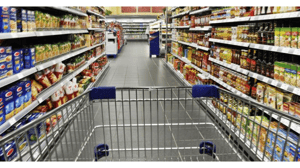Canada eyes ‘Grocery Rebate’ for consumers most in need
Proposal for one-time payment to ease food affordability included in 2023 national budget.

Amid elevated food pricing, Canada’s government has proposed a“Grocery Rebate” to give shoppers a break from inflation.
Under the program, part of Canada’s 2023 budget unveiled last week, the Grocery Rebate would be delivered via a one-time payment from the Canada Revenue Agency following the passage of legislation. In total, $2.5 billion in targeted inflation relief would be earmarked for 11 million low- and modest-income Canadians and families.
Prime Minister Justin Trudeau and other Canadian public officials noted that the Grocery Rebate would provide assistance to those with the greatest need. Though, inflation in Canada has declined for eight consecutive months, food prices remain high and have even escalated in some categories.
“With grocery prices on the rise, we’re putting more money back into the pockets of Canadians who need it most, when they need it most,” Trudeau said in a statement on Monday. The new Grocery Rebate, and the other measures we've put forward in Budget 2023, will help build an economy that works for everyone, where every Canadian family can afford to put food on the table."
On average, the Grocery Rebate would provide eligible couples with two children with up to $467 extra, while single Canadians without children would receive up to $234. Also, seniors would get an extra $225, on average.
According to Steven Guilbeault, minister of environment and climate change, the Grocery Rebate would provide important relief without exacerbating inflation. The 2023 budget also includes actions to crack down on junk fees and predatory lending, lower credit card transaction fees for small businesses, and expand access to health care services, among other items.
“This budget is going to help a lot of Canadians. We’re putting in place measures to help with one of the things where we’ve seen the biggest price increases: groceries,” Guilbeault stated on Thursday. “The new Grocery Rebate will provide relief for 11 million Canadians and families who need it the most. Budget 2023 is our plan to make life more affordable, strengthen public health care and build a stronger, more sustainable and more secure Canadian economy—for everyone.”

In Canada, discount grocery banners have drawn more attention from shoppers amid this period of elevated food price inflation. / Photo: Shutterstock
The Grocery Rebate should be welcome to Canadians, especially as many have begun taking a more critical look at what’s behind high food prices—and whether grocery retailers and manufacturers are engaging in “greedflation.”
A mid-March report by market researcher Mintel found that 83% of Canadian food shoppers think grocers and food producers are using inflation as an excuse to price gouge. What’s more, 76% of those surveyed agreed that they feel “trapped” by having no choice but to absorb escalating food prices, no matter how much they rise.
In getting squeezed by inflated food pricing, 59% of shoppers indicated they’re more likely to watch their spending groceries, according to Mintel. The vast majority of respondents (94%) agreed the sharp rise in food costs is particularly unfair to people with lower incomes, 73% of those polled said food inflation is inflicting added stress, heightening the need for grocers and manufacturers to mitigate high pricing.
“In shoppers’ minds, retailers and food producers are leveraging the challenges they are facing to their benefit, giving rise to the term ‘greedflation,’” explained Joel Gregoire, director of food and drink at Mintel Reports Canada. “Addressing food inflation extends beyond just rising prices but also connecting compassionately with consumers and understanding that many are facing financial hardships. While food inflation is unlikely to persist at these levels, grocers and food producers must recognize the damage it is doing to the industry’s standing. Brands that can convey how they are taking steps to be transparent and ‘be on the side of consumers’ when it comes to saving money can bolster the brand’s perception both in the short term and beyond.”
Earlier in March, the chiefs of Canada’s three largest grocery retailers—Loblaw Cos., Empire Company Ltd./Sobeys Inc. and Metro Inc.—were grilled by lawmakers in a House of Commons committee hearing to probe ongoing food inflation. All three leaders—Galen Weston of Loblaw, Michael Medline of Empire/Sobeys and Eric La Flèche of Metro—said grocers aren’t behind high grocery prices and noted that elevated food inflation afflicts not just Canada but many countries.
About the Author
You May Also Like






